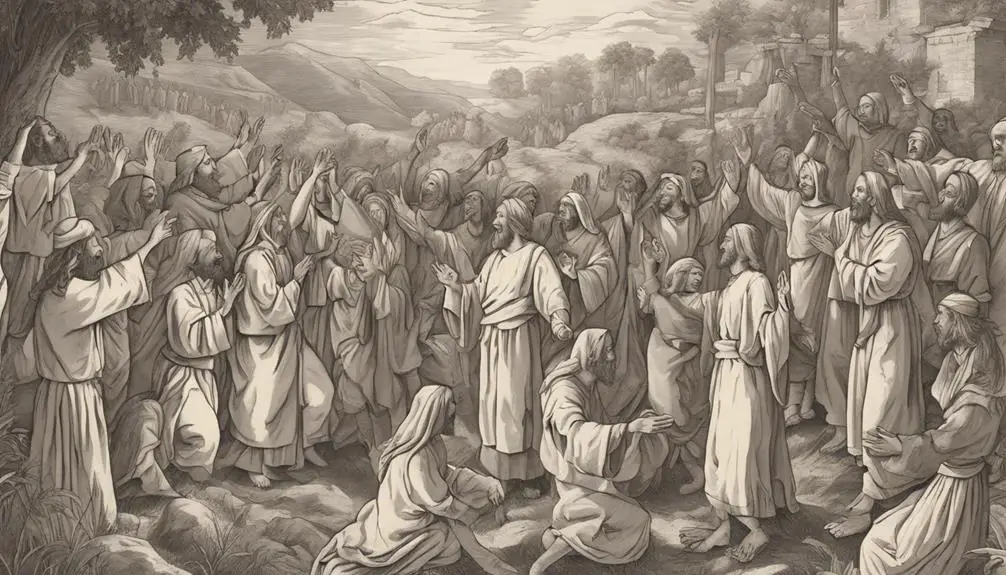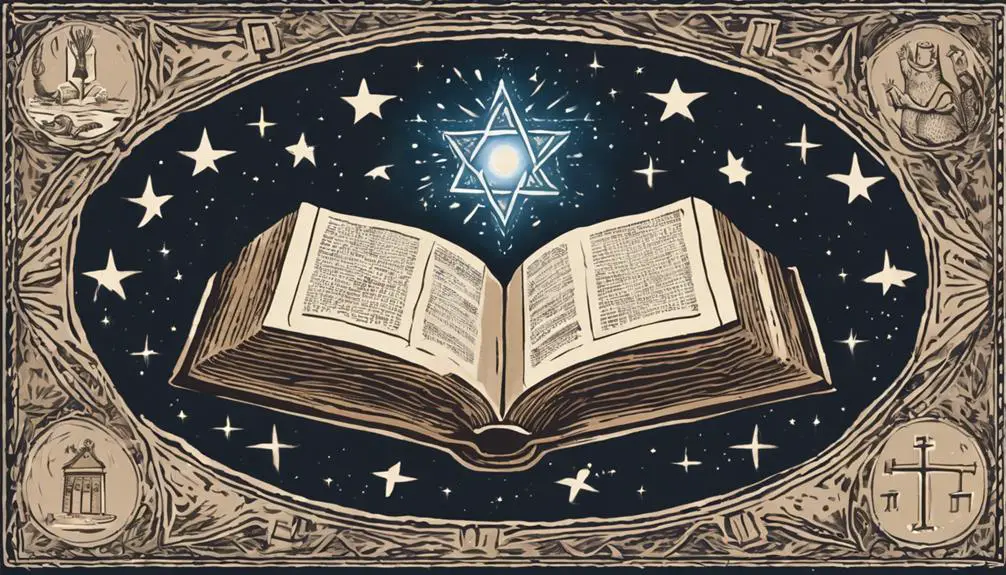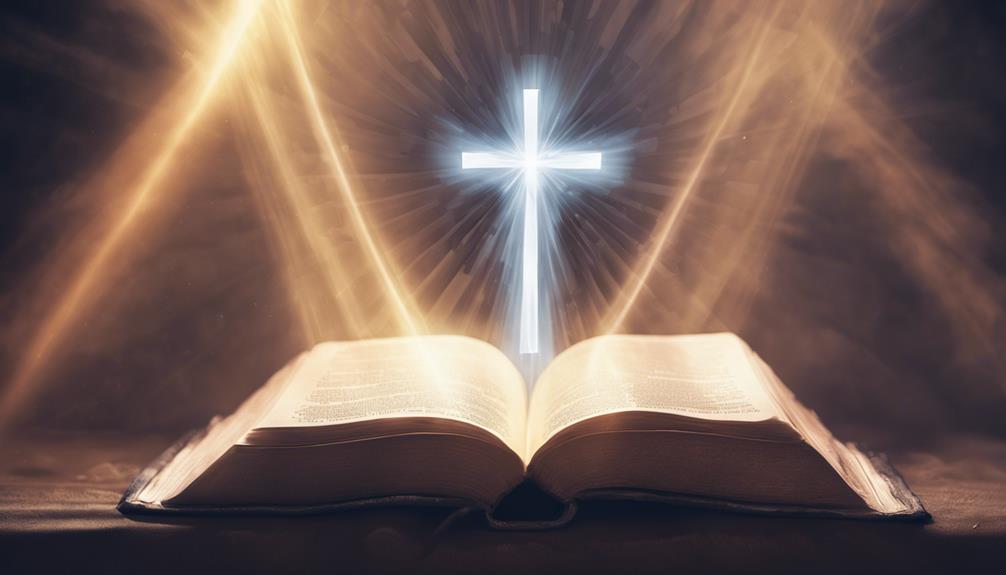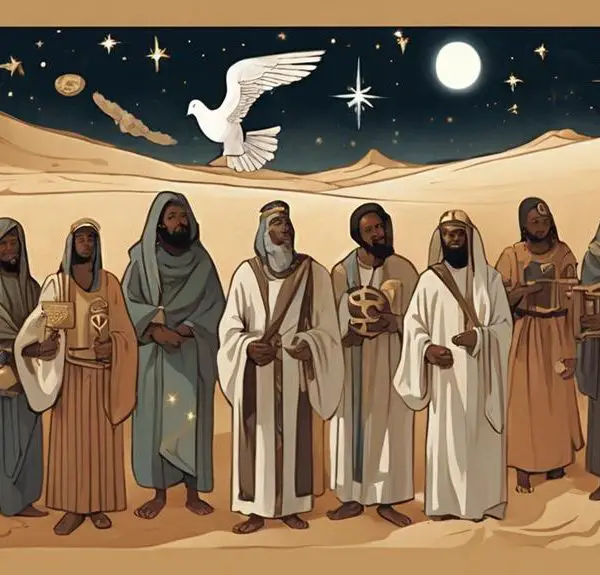Traverse the biblical landscape to understand 'extol', a term of deep praise, and its significant implications in faith.

Extol Meaning in the Bible
'As the old adage goes, actions speak louder than words, but what about the words we use to speak of our actions, particularly in the context of faith?
In the Bible, the term 'extol' is often encountered, a word that goes beyond mere admiration or respect. When you extol, you're praising highly, often in a public or vocal way. It's a term that carries significant weight and meaning.
So, how is this idea used and interpreted in the Bible? Let's explore this further, and you might just find your understanding of faith deepening in unexpected ways.'
Key Takeaways
- 'Extol', originating from Latin 'extollere', signifies high praise mainly directed towards God in the Bible.
- Biblical instances of 'extol' demonstrate reverence, gratitude, and deep devotion, emphasizing God's supremacy.
- In religious practices, 'extol' is central to worship and varies across different faiths, highlighting universal reverence for the divine.
- 'Extol' fosters spiritual growth and understanding by encouraging reflection on divine virtues and active engagement in acts of worship.
Definition of 'Extol' in Scriptures

In your exploration of the scriptures, you'll encounter the term 'extol', a verb that, in a biblical context, primarily signifies the act of high praise, often directed towards God, reflecting deep admiration and respect. It's an intriguing word, beckoning the curious to dig deeper into its origin and usage.
To embark on our 'Extol' etymology exploration, let's delve into its roots. Extol originates from the Latin 'extollere', combining 'ex' meaning 'up' and 'tollere' to 'lift'. Essentially, to extol is to 'lift up' in praise. This understanding illuminates the use of 'extol' in scriptures as an act of elevating God through praise.
But let's not restrict our exploration to the religious sphere. 'Extol' in secular literature also carries a similar connotation. Authors use 'extol' to express high praise or admiration for a person, quality, or event. Whether it's a heroic act, a noble trait, or remarkable achievement, 'extol' encapsulates the admiration and esteem accorded to it.
However, note that 'extol' isn't merely about praising; it's an active, passionate, and profound expression of respect. It's an overt declaration of worthiness, validating the object of praise.
Biblical Instances of 'Extol

Having explored the meaning and connotations of 'extol', let's now turn our focus to specific instances in the Bible where this term is used. The usage of 'extol' in the Bible often correlates with instances of praise or adoration, typically directed towards God.
Consider the table below, where you'll find instances of 'extol' in Parables and Prophecy:
Biblical Book |
Verse |
Context |
|---|---|---|
Psalms |
30:1 |
David extols God for delivering him |
Luke |
1:46 |
Mary extols God in the Magnificat |
Isaiah |
25:1 |
Isaiah's prophecy extols God's planned destruction of a city |
In Psalms, David extols God for his deliverance, demonstrating the usage of 'extol' as a term of reverence and gratitude. In the Gospel of Luke, Mary's Magnificat is a clear instance of extolling God's greatness and mercy. Lastly, the prophecy of Isaiah shows 'extol' employed in the context of future events, underscoring God's justice.
These instances not only shed light on the frequency of 'extol' in biblical texts but also its application in various narratives and genres within the Bible. They underline 'extol' as a term of deep admiration and reverence.
Theological Interpretation of 'Extol

When you delve into the theological interpretation of 'extol', you'll find that it's a term imbued with significant spiritual connotations and implications. It's a word that, in its biblical context, conveys a profound reverence, admiration, and praise for God's divine qualities and deeds.
In Psalms, 'extol' is often employed to express deep devotion and gratitude towards God. The psalmists extol God as they reflect on His wonderful works, showcasing their awe and appreciation. This usage of 'extol' underscores the divine-human relationship, emphasizing the believer's acknowledgment of God's supremacy.
'Extol' in prophetic literature also carries a rich spiritual resonance. Prophets, as God's mouthpieces, employ 'extol' to affirm God's righteousness and mercy, even in the face of impending judgment. This usage illuminates the crucial role of praise in the prophetic mandate, underscoring the prophet's task of drawing the people closer to God through the act of extolling Him.
In essence, the theological interpretation of 'extol' aligns with a deep-seated reverence for God, a recognition of His divine attributes, and an ongoing commitment to honour Him, indicating a profound aspect of biblical spirituality.
Extol' in Contemporary Religion

Moving to a modern context, you'll find that the practice of extolling, deeply rooted in biblical tradition, continues to hold a significant place in contemporary religious expressions. 'Extol' in modern worship isn't confined to a single faith or tradition. It has found resonance across diverse religious interpretations, signifying the universal appeal of praise and adoration towards a higher power.
In Christianity, extolling God is central to worship, often expressed through songs and prayers that glorify His divine attributes. Similarly, in Islam, extolling or 'Tasbeeh' is a regular part of daily prayers and devotional practices. In Buddhism, extolling the virtues of Buddha and His teachings forms an integral part of meditative practices.
However, the function and interpretation of 'extol' varies across these religious landscapes. For Christians, extolling is a means to acknowledge God's omnipotence, while for Muslims, it's a gesture of submission and gratitude to Allah. Buddhists, on the other hand, extol as a tool for spiritual development, reinforcing the teachings of Buddha in their minds.
The Spiritual Impact of 'Extol

In exploring the spiritual impact of 'extol', it's crucial to recognize how this act of praise and adoration can deeply influence an individual's spiritual journey and connection with the divine. When you integrate 'extol' in prayer, you're not merely reciting verses but actively acknowledging God's greatness and expressing gratitude for His blessings.
This act of extolling has a transformative effect on your spiritual growth. It encourages humility by recognizing the divine's omnipotence, thereby fostering a stronger relationship with God. As you extol, you're prompted to reflect on God's virtues, stirring up feelings of awe and reverence. This reflective process enhances understanding and intimacy with the divine, fueling spiritual growth.
Moreover, 'extol' serves as a spiritual discipline that cultivates patience, resilience, and spiritual maturity. It's a process of persistent praise, requiring dedication and commitment. The consistent practice of extolling, regardless of circumstances, helps you maintain a positive outlook, fostering spiritual fortitude.
In essence, 'extol' is more than a biblical term or a form of prayer; it's a pathway to spiritual growth, transformation, and a deeper understanding of the divine essence. Through 'extol', you're not only connecting with God on a profound level, but you're also nurturing your own spiritual development.
Frequently Asked Questions
How Does the Concept of 'Extol' Relate to Other Similar Terms in the Bible?"
In the Bible, 'extol' often aligns with terms like 'praise' or 'glorify.' You'll see it used when individuals express deep admiration and reverence for God.
The symbolism in 'extol' lies in its intent to elevate God's stature. It's not just about acknowledging His presence, it's about lifting Him up in honor.
What Is the Historical Context Around the Use of 'Extol' in the Bible?"
When you delve into 'extol's origins' in a historical context, you'll find it's linked to expressions of high praise.
In Biblical symbolism, it often signifies worshipful admiration toward God. It's seen in Psalms, used by David to glorify God's deeds.
Understanding this, you'll find 'extol' isn't just praise, it's a profound, reverential acclaim given to God's magnificence, reflecting a deep-rooted tradition of worship in Biblical times.
Are There Any Cultural Implications in the Use of 'Extol' in Biblical Texts?"
Yes, there are cultural implications in using 'extol' in biblical texts. Extol's linguistic origin from the Hebrew word 'halal' often symbolizes praise or honor.
In the Bible, to 'extol' isn't just to praise, but to lift high, symbolizing the act of exalting God above all else. This reflects the cultural importance of expressing reverence and devotion within the religious context of biblical times.
How Does the Meaning of 'Extol' in the Bible Differ Across Various Translations and Interpretations of the Bible?"
In analyzing 'extol' across various Bible translations, you'll notice nuanced differences. This term's symbolism can shift based on language subtleties.
Some translations may use 'extol' to convey intense praise, while others might imply a more reserved admiration. Understanding these differences isn't just about language proficiency; it's about grasping the cultural and historical contexts that color Biblical interpretation.
How Does the Use of 'Extol' in the Bible Compare to Its Use in Other Religious Texts?"
When you compare 'extol' in the Bible to other religious texts, you'll find some differences. Extol's linguistic origin is from Latin, often used in prayers to praise or uplift.
In other texts, it can hold similar or different connotations, depending on cultural and linguistic contexts.
Analyzing these variations provides a detailed understanding of how religious language and meanings evolve over time and across different faith traditions.
Conclusion
In understanding 'extol' in biblical context, you've unlocked an important aspect of your spiritual journey. You've seen its application in scripture, theological interpretation, and modern religion.
The act of extolling, praising highly, holds profound spiritual implications. It's a call to admire God's goodness, strengthening your spiritual connection.
So, continue to 'extol' in your daily life and observe the depth it adds to your faith.



Sign up